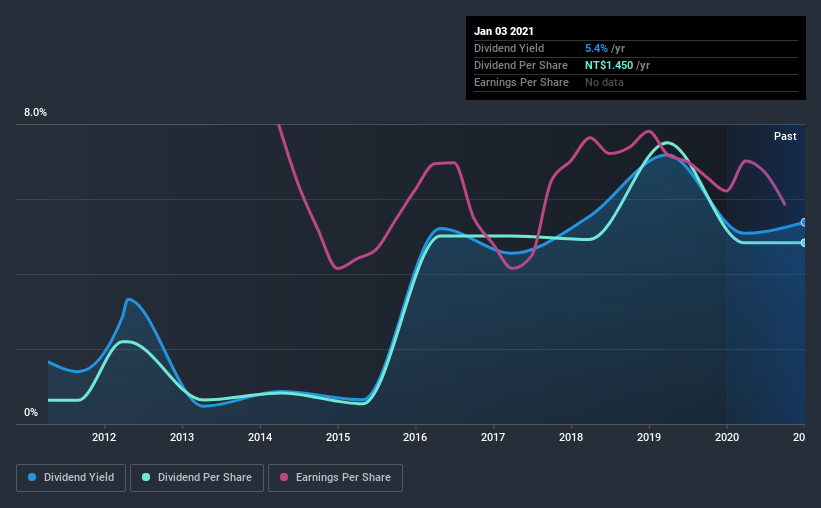- Taiwan
- /
- Medical Equipment
- /
- TWSE:4155
Consider This Before Buying OK Biotech Co., Ltd. (TPE:4155) For The 5.4% Dividend

Is OK Biotech Co., Ltd. (TPE:4155) a good dividend stock? How can we tell? Dividend paying companies with growing earnings can be highly rewarding in the long term. If you are hoping to live on your dividends, it's important to be more stringent with your investments than the average punter. Regular readers know we like to apply the same approach to each dividend stock, and we hope you'll find our analysis useful.
A high yield and a long history of paying dividends is an appealing combination for OK Biotech. It would not be a surprise to discover that many investors buy it for the dividends. Some simple research can reduce the risk of buying OK Biotech for its dividend - read on to learn more.
Click the interactive chart for our full dividend analysis

Payout ratios
Dividends are usually paid out of company earnings. If a company is paying more than it earns, then the dividend might become unsustainable - hardly an ideal situation. So we need to form a view on if a company's dividend is sustainable, relative to its net profit after tax. In the last year, OK Biotech paid out 90% of its profit as dividends. Paying out a majority of its earnings limits the amount that can be reinvested in the business. This may indicate a commitment to paying a dividend, or a dearth of investment opportunities.
In addition to comparing dividends against profits, we should inspect whether the company generated enough cash to pay its dividend. Last year, OK Biotech paid a dividend while reporting negative free cash flow. While there may be an explanation, we think this behaviour is generally not sustainable.
With a strong net cash balance, OK Biotech investors may not have much to worry about in the near term from a dividend perspective.
Remember, you can always get a snapshot of OK Biotech's latest financial position, by checking our visualisation of its financial health.
Dividend Volatility
One of the major risks of relying on dividend income, is the potential for a company to struggle financially and cut its dividend. Not only is your income cut, but the value of your investment declines as well - nasty. OK Biotech has been paying dividends for a long time, but for the purpose of this analysis, we only examine the past 10 years of payments. Its dividend payments have declined on at least one occasion over the past 10 years. During the past 10-year period, the first annual payment was NT$0.2 in 2011, compared to NT$1.5 last year. This works out to be a compound annual growth rate (CAGR) of approximately 23% a year over that time. The dividends haven't grown at precisely 23% every year, but this is a useful way to average out the historical rate of growth.
It's not great to see that the payment has been cut in the past. We're generally more wary of companies that have cut their dividend before, as they tend to perform worse in an economic downturn.
Dividend Growth Potential
With a relatively unstable dividend, it's even more important to see if earnings per share (EPS) are growing. Why take the risk of a dividend getting cut, unless there's a good chance of bigger dividends in future? OK Biotech's EPS are effectively flat over the past five years. Over the long term, steady earnings per share is a risk as the value of the dividends can be reduced by inflation. There are exceptions, but limited earnings growth and a high payout ratio can signal that a company is struggling to grow. That's fine as far as it goes, but we're less enthusiastic as this often signals that the dividend is likely to grow slower in the future.
We'd also point out that OK Biotech issued a meaningful number of new shares in the past year. Regularly issuing new shares can be detrimental - it's hard to grow dividends per share when new shares are regularly being created.
Conclusion
When we look at a dividend stock, we need to form a judgement on whether the dividend will grow, if the company is able to maintain it in a wide range of economic circumstances, and if the dividend payout is sustainable. First, the company has a payout ratio that was within an average range for most dividend stocks, but it paid out virtually all of its generated cash flow. Second, earnings have been essentially flat, and its history of dividend payments is chequered - having cut its dividend at least once in the past. With this information in mind, we think OK Biotech may not be an ideal dividend stock.
Companies possessing a stable dividend policy will likely enjoy greater investor interest than those suffering from a more inconsistent approach. Still, investors need to consider a host of other factors, apart from dividend payments, when analysing a company. Taking the debate a bit further, we've identified 3 warning signs for OK Biotech that investors need to be conscious of moving forward.
We have also put together a list of global stocks with a market capitalisation above $1bn and yielding more 3%.
When trading OK Biotech or any other investment, use the platform considered by many to be the Professional's Gateway to the Worlds Market, Interactive Brokers. You get the lowest-cost* trading on stocks, options, futures, forex, bonds and funds worldwide from a single integrated account. Promoted
If you're looking to trade OK Biotech, open an account with the lowest-cost platform trusted by professionals, Interactive Brokers.
With clients in over 200 countries and territories, and access to 160 markets, IBKR lets you trade stocks, options, futures, forex, bonds and funds from a single integrated account.
Enjoy no hidden fees, no account minimums, and FX conversion rates as low as 0.03%, far better than what most brokers offer.
Sponsored ContentNew: AI Stock Screener & Alerts
Our new AI Stock Screener scans the market every day to uncover opportunities.
• Dividend Powerhouses (3%+ Yield)
• Undervalued Small Caps with Insider Buying
• High growth Tech and AI Companies
Or build your own from over 50 metrics.
This article by Simply Wall St is general in nature. It does not constitute a recommendation to buy or sell any stock, and does not take account of your objectives, or your financial situation. We aim to bring you long-term focused analysis driven by fundamental data. Note that our analysis may not factor in the latest price-sensitive company announcements or qualitative material. Simply Wall St has no position in any stocks mentioned.
*Interactive Brokers Rated Lowest Cost Broker by StockBrokers.com Annual Online Review 2020
Have feedback on this article? Concerned about the content? Get in touch with us directly. Alternatively, email editorial-team (at) simplywallst.com.
About TWSE:4155
OK Biotech
Develops, manufactures, markets, and sells blood glucose monitoring devices and related homecare medical products in Taiwan and internationally.
Excellent balance sheet with proven track record.

